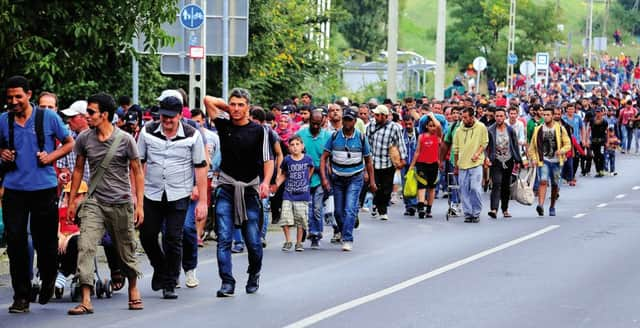Nightmare ends for 600 refugees arriving in Munich


Earlier, more than 1,000 refugees crossed the border from Hungary into Austria after a fleet of buses picked them up from the side of a motorway where they were sheltering from heavy rain after walking almost 100 miles from Budapest. By late yesterday the number entering Austria had risen to around 5,000.
Before dawn, the first wave of people clambered off the buses at the Austrian border to find a warm welcome from charity workers offering beds and hot tea. Within a few more hours many found themselves taken by train to the Austrian capital, Vienna, and then on to Munich.
Advertisement
Hide AdAdvertisement
Hide AdAlthough the exodus of refugees from Budapest eased the immediate pressure on Hungary, it was short-lived. Hours after the first group left Budapest’s Keleti station, an estimated 1,000 more refugees were reported to be headed for the city.
Last night the German authorities confirmed the arrival of 600 refugees but said they expected that number to rise to around 10,000 in the coming days.
With the humanitarian crisis engulfing Europe showing no sign of abating, the Chancellor George Osborne said yesterday that there must be a “comprehensive plan” to deal with the root causes of the influx that has seen hundreds of thousands of desperate people trying to seek sanctuary.
Speaking at a meeting of G20 finance ministers in Turkey, Osborne said the problem had to be dealt with “at source”, which meant tackling both the “evil” regime of Syrian president Bashar al-Assad and the militant jihadists of Islamic State (IS).
His comments came as some senior Tories called on the government to bring forward plans to extend RAF air strikes against IS into Syria. Former defence secretary Liam Fox said ministers should also seek to build international support for the creation of a safe haven inside Syria where refugees could be protected without attempting the hazardous journey to Europe.
Last week, David Cameron bowed to intense public and political pressure, with the announcement that Britain would accept “thousands more” refugees from the camps in countries bordering Syria. However, Osborne said yesterday that resettling refugees could only be one element of a wider plan to deal with the crisis.
“You have got to deal with the problem at source which is this evil Assad regime and the Isil terrorists,” he said.
“You need a comprehensive plan for a more stable, peaceful Syria – a huge challenge of course, but we can’t just let that crisis fester.”
Advertisement
Hide AdAdvertisement
Hide AdFox said that ministers should now be prepared to extend RAF strikes against IS in Iraq into Syria, as well as seeking support for an international safe haven protected by a no-fly zone.
“The policy of attacking Isis in Iraq but not in Syria is patently absurd which not only makes us less effective militarily but diminishes us in the eyes of other partners in the coalition,” he said.
Some senior figures at Westminster have expressed doubts as to whether Cameron would be prepared to risk another Commons vote on military action in Syria after his bruising defeat on air strikes against Assad two years ago.
The Prime Minister has repeatedly said that he would seek a parliamentary consensus before attacking IS in Syria, and with the prospect of a victory for left-winger Jeremy Corbyn in the Labour leadership contest, that would appear increasingly unlikely.
Yesterday the human rights watchdog, Amnesty International, welcomed the initiative to clear the human logjam in Hungary, where thousands of refugees were stranded at the station for several days.
“After endless examples of shameful treatment by governments of refugees and migrants in Europe, it is a relief to finally see a sliver of humanity. But this is far from over, both in Hungary and in Europe as a whole,” said Gauri van Gulik, Amnesty’s deputy director for Europe. “The pragmatic and humane approach finally applied here should become the rule, not the exception.”
But Hungary’s hardline prime minister, Viktor Orban, told reporters the opposite was more likely. He said Hungary collected and drove the migrants to the border only because they were posing a public menace, particularly by snarling traffic and rail lines west of Budapest.
“It is unacceptable for them to paralyse traffic on the highway and they are putting their own lives at risk,” Orban said at his ruling party’s annual picnic in a village near Lake Balaton.
Advertisement
Hide AdAdvertisement
Hide AdOrban said Hungary was determined to reduce the flow of foreigners trying to cross the country en route to wealthier, more immigrant-friendly western European countries.
Yesterday Germany’s Chancellor Angela Merkel, who has led calls for other EU members to shelter more migrants as potential refugees said that her country would observe no legal limit on the number of asylum seekers it might take.
Merkel said: “The right to political asylum has no limits on the number of asylum seekers. As a strong, economically healthy country we have the strength to do what is necessary.”